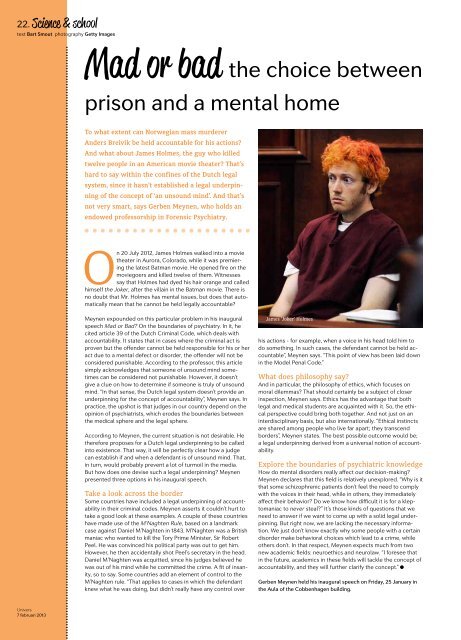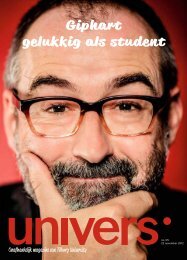Pech met je promotor - Univers
Pech met je promotor - Univers
Pech met je promotor - Univers
Create successful ePaper yourself
Turn your PDF publications into a flip-book with our unique Google optimized e-Paper software.
22. Science & school<br />
text Bart Smout photography Getty Images<br />
<strong>Univers</strong><br />
7 februari 2013<br />
Mad or bad the choice between<br />
prison and a mental home<br />
To what extent can Norwegian mass murderer<br />
Anders Breivik be held accountable for his actions?<br />
And what about James Holmes, the guy who killed<br />
twelve people in an American movie theater? That’s<br />
hard to say within the confines of the Dutch legal<br />
system, since it hasn’t established a legal underpinning<br />
of the concept of ‘an unsound mind’. And that’s<br />
not very smart, says Gerben Meynen, who holds an<br />
endowed professorship in Forensic Psychiatry.<br />
On 20 July 2012, James Holmes walked into a movie<br />
theater in Aurora, Colorado, while it was premiering<br />
the latest Batman movie. He opened fire on the<br />
moviegoers and killed twelve of them. Witnesses<br />
say that Holmes had dyed his hair orange and called<br />
himself the Joker, after the villain in the Batman movie. There is<br />
no doubt that Mr. Holmes has mental issues, but does that automatically<br />
mean that he cannot be held legally accountable?<br />
Meynen expounded on this particular problem in his inaugural<br />
speech Mad or Bad? On the boundaries of psychiatry. In it, he<br />
cited article 39 of the Dutch Criminal Code, which deals with<br />
accountability. It states that in cases where the criminal act is<br />
proven but the offender cannot be held responsible for his or her<br />
act due to a mental defect or disorder, the offender will not be<br />
considered punishable. According to the professor, this article<br />
simply acknowledges that someone of unsound mind so<strong>met</strong>imes<br />
can be considered not punishable. However, it doesn’t<br />
give a clue on how to determine if someone is truly of unsound<br />
mind. “In that sense, the Dutch legal system doesn’t provide an<br />
underpinning for the concept of accountability”, Meynen says. In<br />
practice, the upshot is that judges in our country depend on the<br />
opinion of psychiatrists, which erodes the boundaries between<br />
the medical sphere and the legal sphere.<br />
According to Meynen, the current situation is not desirable. He<br />
therefore proposes for a Dutch legal underpinning to be called<br />
into existence. That way, it will be perfectly clear how a judge<br />
can establish if and when a defendant is of unsound mind. That,<br />
in turn, would probably prevent a lot of turmoil in the media.<br />
But how does one devise such a legal underpinning? Meynen<br />
presented three options in his inaugural speech.<br />
Take a look across the border<br />
Some countries have included a legal underpinning of accountability<br />
in their criminal codes. Meynen asserts it couldn’t hurt to<br />
take a good look at these examples. A couple of these countries<br />
have made use of the M’Naghten Rule, based on a landmark<br />
case against Daniel M’Naghten in 1843. M’Naghten was a British<br />
maniac who wanted to kill the Tory Prime Minister, Sir Robert<br />
Peel. He was convinced his political party was out to get him.<br />
However, he then accidentally shot Peel’s secretary in the head.<br />
Daniel M’Naghten was acquitted, since his judges believed he<br />
was out of his mind while he committed the crime. A fit of insanity,<br />
so to say. Some countries add an element of control to the<br />
M’Naghten rule. “That applies to cases in which the defendant<br />
knew what he was doing, but didn’t really have any control over<br />
James 'Joker' Holmes<br />
his actions - for example, when a voice in his head told him to<br />
do so<strong>met</strong>hing. In such cases, the defendant cannot be held accountable”,<br />
Meynen says. “This point of view has been laid down<br />
in the Model Penal Code.”<br />
What does philosophy say?<br />
And in particular, the philosophy of ethics, which focuses on<br />
moral dilemmas? That should certainly be a sub<strong>je</strong>ct of closer<br />
inspection, Meynen says. Ethics has the advantage that both<br />
legal and medical students are acquainted with it. So, the ethical<br />
perspective could bring both together. And not just on an<br />
interdisciplinary basis, but also internationally. “Ethical instincts<br />
are shared among people who live far apart; they transcend<br />
borders”, Meynen states. The best possible outcome would be;<br />
a legal underpinning derived from a universal notion of accountability.<br />
Explore the boundaries of psychiatric knowledge<br />
How do mental disorders really affect our decision-making?<br />
Meynen declares that this field is relatively unexplored. “Why is it<br />
that some schizophrenic patients don’t feel the need to comply<br />
with the voices in their head, while in others, they immediately<br />
affect their behavior? Do we know how difficult it is for a kleptomaniac<br />
to never steal?” It’s those kinds of questions that we<br />
need to answer if we want to come up with a solid legal underpinning.<br />
But right now, we are lacking the necessary information.<br />
We just don’t know exactly why some people with a certain<br />
disorder make behavioral choices which lead to a crime, while<br />
others don’t. In that respect, Meynen expects much from two<br />
new academic fields: neuroethics and neurolaw. “I foresee that<br />
in the future, academics in these fields will tackle the concept of<br />
accountability, and they will further clarify the concept.”<br />
Gerben Meynen held his inaugural speech on Friday, 25 January in<br />
the Aula of the Cobbenhagen building.
















